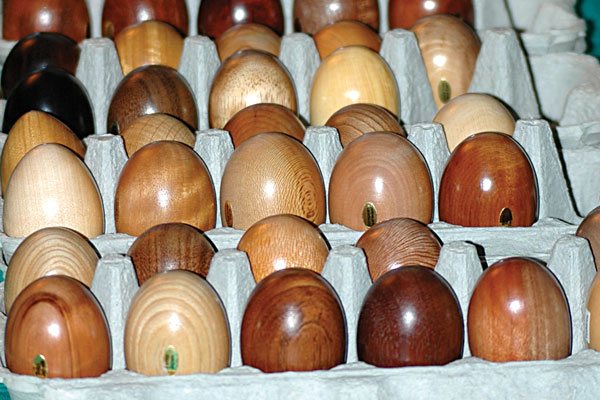Charlie Johnson owns 235 eggs, but not a single hen. And no one would make an omelette with his beautiful wooden objects.
In 1979, Johnson saw an ad in The Wall Street Journal for woods of the world. Curious, he contacted the company and was sent a list of eggs made from exotic woods. He bought a few and was hooked.
For the next 20 years, until the company went out of business in 1999, Johnson continued to buy the beautifully lathed eggs made from wood from around the world from a firm called Woods of the World. The woods came from hardwood importers, not lumber yards.
The eggs range in color from ebony black to Florida palm wood white. Some are as common as pine and fir; others, as rare as Madagascar ebony and African blackwood.
Polished twice a year
Johnson keeps his collection in old egg cartons with each carton labeled as to the country of origin and the name of each egg. Most of the eggs are 21/4 inches long, about 20-percent larger than what most hens lay.
Johnson takes them out twice a year to polilsh and just to look at. Then he carefully returns them to their labeled places and stores the cartons in antique egg boxes that once were used to take eggs to market.
Johnson was in the lumber business all his life, working for U.S. Lumber. He ended his career as regional marketing manager in the San Francisco area.
Woods of the World started as an idea for giving bosses a unique gift. The eggs were put on wooden bases with room for one, two or three eggs. Although Johnson traveled to Cincinnati, Ohio, to visit the owners, they would not let him see how the eggs were made. It is obvious the eggs were made on a lathe, but the exact technique was kept secret.
Johnson says the eggs eventually will go to his grandson who asks to see them every time he visits.
Reach Dana Casey at dcasey@sequimgazette.com



